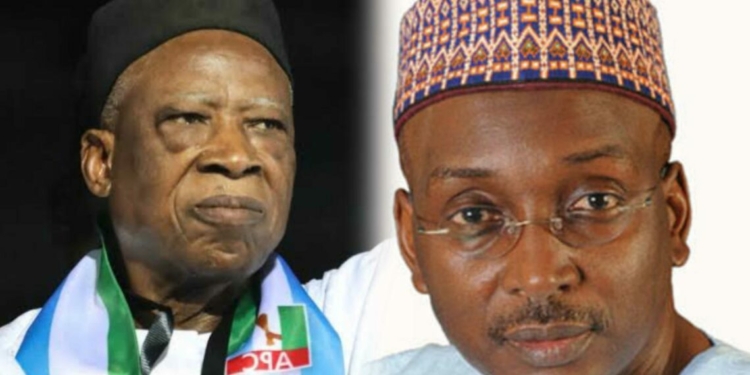Salihu Lukman, the National Vice Chairman for the Northwest Region of the All Progressives Congress (APC), has charged Senator Abdullahi Adamu, the party’s National Chairman, with working against the zoning scheme decided upon by the National Working Committee (NWC) for leadership positions in the 10th National Assembly.
A “conservative bloc” in the party leadership, according to a statement released by Lukman yesterday in Abuja, is allegedly spewing out extreme ethnic northern arguments against the zoning decisions that the NWC has approved as a result of discussions between the Adamu-led NWC team and President Bola Tinubu.
“As if those consultations were not designed to produce agreements, once the NWC approved the recommendation for zoning the leadership of the 10th National Assembly, Sen. Abdullahi Adamu, instead of acting as the National Chairman, facilitating implementation of decisions of organs of the party, he is acting as a factional leader opposing the decision of the NWC.
“Instead of working for the success of the decision of the NWC through activating meetings of higher organs of the party to confer more legitimacy to the decision of the NWC, he seems to be more interested in ensuring that the 2015 model of rebellious leadership emerge in the 10th National Assembly”, he stated.
The APC-NWC had adopted Senators Godswill Akpabio and Barau Jibrin for Senate President and Deputy Senate President, while it also adopted Tajudeen Abbas and Ben Kalu for the House Speakership and deputy respectively.
According to Lukman, the biggest challenge for APC in concluding the transition into the new era of President Tinubu is whether the vision of producing a progressive party managing progressive governance initiatives will be produced.
He said to have a progressive party requires dynamism, action and improvement both in the management of the party and the governments it produced.
‘Why we almost lost 2023 polls’
On why the APC almost lost the 2023 elections, Lukman said it was the inability to properly manage internal contestations within the party.
“This is largely because, although since its formation, internal contestation within the APC remained very strong, capacity of the party leadership to facilitate internal negotiations within the party, producing agreements that are respected by all remained weak. In addition, the party was unable to use its position as a ruling party both at Federal level and in many states it produced government to its advantage.
“All these negatively affected the electoral viability of the APC. If the truth must be said, as a party, we didn’t manage electoral victory very well. Since 2015, after winning the Presidential elections, we allowed many PDP appointees to remain in the service of Federal Government, including Mr. Godwin Emefiele who was inherited as CBN governor.”
”This has produced some gaps in terms of policy implementation aimed at achieving campaign promises. There is also the case of allowing appointees to remain in office even when they failed to meet expectations.
”This created unhealthy situations whereby many APC supporters felt neglected and therefore demoralised. In addition, there is the inability of APC governments, especially at federal level to take new initiatives as responsive measures to respond to emerging challenges.
”A good example is the issue of handling security challenges of banditry in the North-West and North-Central. Although, in terms of investment in hardware, arms procurement and personnel recruitment, relative to past governments, APC under former President Buhari has made significant investments, inability to boldly rolled out new initiatives weakened impact of the investment,” he stated.










Discussion about this post